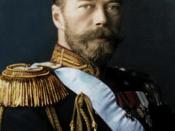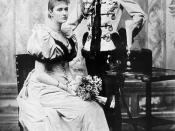For over three hundred years, Imperial Russia was in the hands of the Romanov family, beginning in 1613 with Michael Romanov. What became a mighty Russian Empire over three centuries was to crumble in 1917 in the hands of Nicholas Romanov II- the last Tsar. Although much of the blame is placed on Nicholas himself, other factors must be taken into consideration when accounting for the fall of the dynasty, such as the events of 1905, social repression and civil unrest from 1906 to1914, the impact of World War One, the ruling techniques of Nicholas and constant revolutionary forces. These factors, attributing to the demise of the Romanovs are all recounted in the 1971 film Nicholas and Alexandra.
The beginning of the twentieth century was a time of political, economic and civil unrest for Russia, reaching a climax in 1905 as Russia entered into war with Japan. The Russian Empire had been facing a problematic time with economic and social difficulties.
Thinking that Japan would be a quick victory and an industrial improvement to kick-start a failing economy, Russia went into battle. Unfortunately, Japan overpowered Russia with a string of crushing naval defeats, exposing the Tsar's incapabilities, financially crippling the Empire, and increasing discontent, leading to talk of revolution.
The culmination of 1905 came on 22nd January, when Father George Gapon organised a protest march for 150,000 people, in order to gain freedom from the appalling living and working conditions of the Russian peasants. This movement was innocent and posed no threat to the Tsar's sovereignty. Regrettably, the marchers met a violent end, many being slaughtered by the Tsar's men as shown in the film Nicholas and Alexander. This event was devastating to the Romanovs, destroying the image held by Nicholas of 'The Little Father', instead, creating an impression of...


